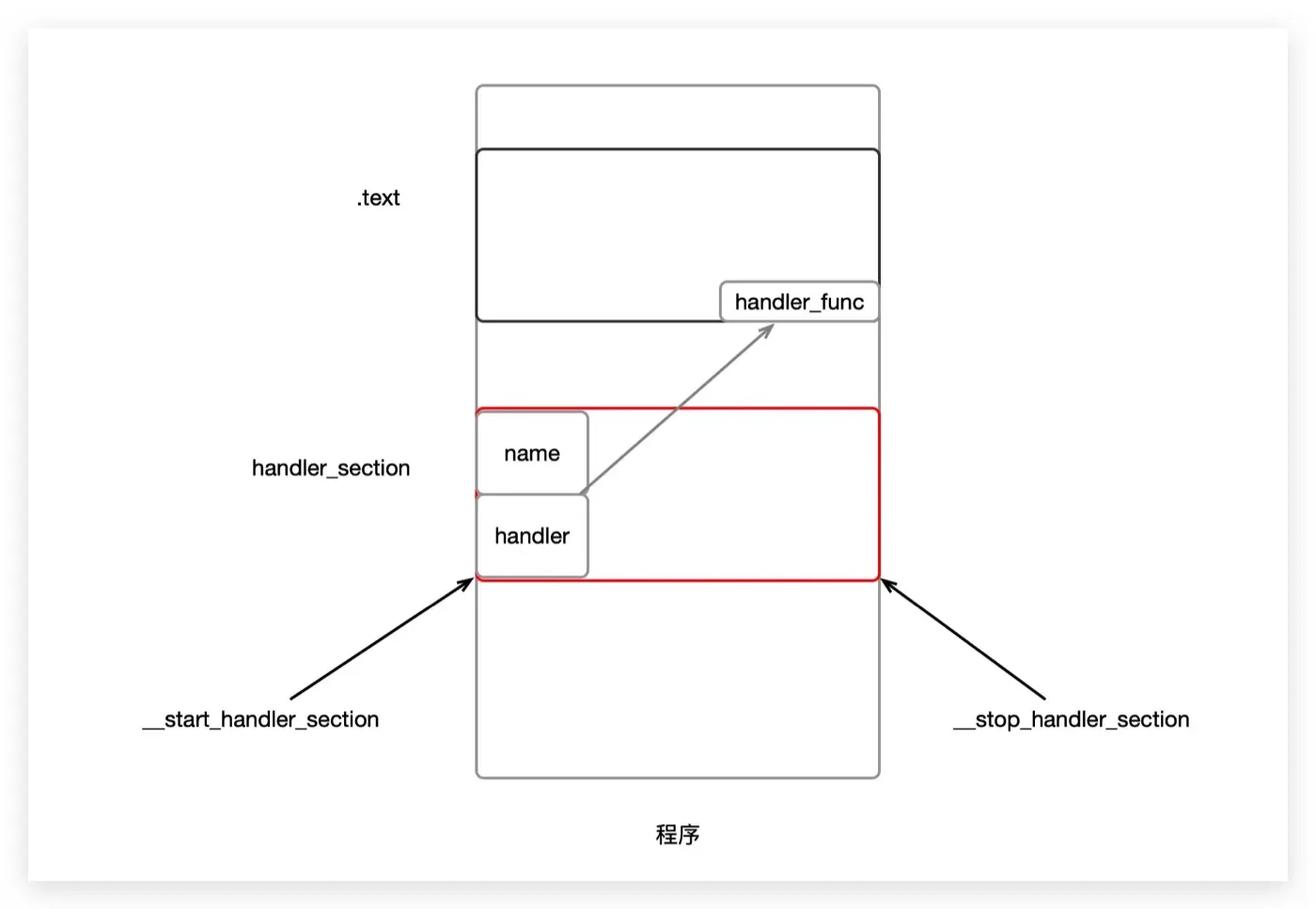通过"字符串"调用同名的函数
在GUI编程里面,在写静态xml布局时;比如Android中,可以通过在xml中指定onClick的回调函数名,即可以实现,在事件触发时调用相应的函数
<Button
android:id="@+id/login_btn"
android:layout_width="wrap_content"
android:layout_height="wrap_content"
android:onClick="onLoginClick"
android:text="Login" />public class MainActivity extends Activity {
@Override
public void onCreate(Bundle savedInstanceState) {
super.onCreate(savedInstanceState);
setContentView(R.layout.main);
}
public void onLoginClick(View v) {
Toast.makeText(this, "Clicked on Login Button", Toast.LENGTH_LONG).show();
}
}上述大多是在高级语言中,这是Java强大的地方,可以通过反射类全名创建对象,调用函数,做相应的;通过自定义注解去生成代码;Java框架中随处可见这样的代码,写一堆xml,properties配置,自定义注解;最大的好处在于模块之间解耦,只要通过字符串,不需要依赖于真正的定义,就可以创建对象或其它操作
类似的,还有QT里面的Signals & Slots, 后来研究发现其实区别挺大,它并没有把这事件函数配置化(把函数名写到配置中),代码:QObject::connect(&a, &Counter::valueChanged, &b, &Counter::setValue);这是一个信号槽的绑定,在这里其实是已经可以拿到两个函数的地址了,本质上是qmake在编译的时候会去生成新代码
现在就用C来实现一个,不需要依赖于真正的函数定义(不需要#include "header.h"),通过这个字符串,去获取这个函数的地址,调用/使用这个函数
一开始想解决这个问题的时候,在网上找了一圈,在C的语言层面上没有解决方案;其实也正常,如果能通过一个字符串去获取一个函数的地址,这会是一个非常大的安全问题;后来我们公司C工在研究另外一个框架,那个框架在做了一件事,把接口配置化了,也就是接口/函数名写在配置文件里面, 后面让他看下源码怎么实现的,他当时也看的是一脸懵逼,触及了知识盲区,正好我早前看过一本书:程序员的自我修养--链接,装载,库, 然后看过了一些gcc的文档; 然后给他梳理了,就有了这文章,下最后通过gcc的__attribute__((section("section_name"))) 属性来解决,下面讲人话:
技术原理:
gcc在编译代码的时候,会对我们写的代码"分类",会把不同的"元素"放在不同的段,也叫section,比如熟悉的.text/.data/.bss段;
程序可执行文件段的大纲:可以通过objdump -h program_name 或是readelf -S program_name去查看:
$ objdump -h a.out
a.out: file format elf64-x86-64
Sections:
Idx Name Size VMA LMA File off Algn
0 .interp 0000001c 0000000000000318 0000000000000318 00000318 2**0
CONTENTS, ALLOC, LOAD, READONLY, DATA
.....
15 .text 000001f5 0000000000001080 0000000000001080 00001080 2**4
CONTENTS, ALLOC, LOAD, READONLY, CODE
16 .fini 0000000d 0000000000001278 0000000000001278 00001278 2**2
CONTENTS, ALLOC, LOAD, READONLY, CODE
17 .rodata 00000017 0000000000002000 0000000000002000 00002000 2**2
CONTENTS, ALLOC, LOAD, READONLY, DATA
.....
24 .data 00000010 0000000000004000 0000000000004000 00003000 2**3
CONTENTS, ALLOC, LOAD, DATA
25 handler 00000010 0000000000004010 0000000000004010 00003010 2**4
CONTENTS, ALLOC, LOAD, DATA
26 .bss 00000008 0000000000004020 0000000000004020 00003020 2**0
ALLOC
27 .comment 0000002a 0000000000000000 0000000000000000 00003020 2**0
CONTENTS, READONLY当然也能通过gcc的__attribute__((section("section_name"))) 来自定义段
__attribute__关键字:
gcc文档:https://gcc.gnu.org/onlinedocs/gcc/index.html大纲 6.33 Attribute Syntax文档:https://gcc.gnu.org/onlinedocs/gcc/Attribute-Syntax.html
怎么理解这个关键字:这里可以用下常的面向对象;gcc在编译代码文件的时候,会对代码文件中的"元素"进行处理,这里的"元素"指的是代码中的基本单位,一个函数,一个类型定义,一个全局变量... __attribute__关键字是用来指定这些元素的属性,比如一个元素放在编译文件的什么位置,
__attribute__关键字可以修饰的"元素":
- Function函数
- Variable变量
- Type类型
- Label
- Statement
- other
__attribute__关键字语法:
__attribute__ ((attribute-list)) // 多个属性用逗号隔开section属性:
将"元素"放在指定段,指定段名字
#include <stdint.h>
#include <stdio.h>
#define SECTION_NAME "handler"
// linker会给这个段添加两个symbol,格式如下:
// start: __start_${section_name}
// stop: __stop_${section_name}
extern int32_t __start_handler[];
extern int32_t __stop_handler[];
// 修饰全局变量
int32_t __attribute__((section(SECTION_NAME))) var1 = 100;
int32_t __attribute__((section(SECTION_NAME))) var2 = 200;
int main() {
printf("var1 = %d\n", var1);
printf("var2 = %d\n", var2);
// 段起始地址
printf("__start_handler addr = %p\n", __start_handler);
printf("__stop_handler addr = %p\n", __stop_handler);
// 段大小
int section_size = (char*)__stop_handler - (char*)__start_handler;
printf("setion_size = %d\n", section_size);
// 通过段去获取数据
printf("__start_handler = %d\n", *__start_handler);
printf("__stop_handler = %d\n", *(__start_handler + 1));
}输出:
$ ./a.out
var1 = 100
var2 = 200
__start_handler addr = 0x5561de356010
__stop_handler addr = 0x5561de356018
setion_size = 8
__start_handler = 100
__stop_handler = 200程序文件段查看:
$ objdump -h a.out
a.out: file format elf64-x86-64
Sections:
Idx Name Size VMA LMA File off Algn
0 .interp 0000001c 0000000000000318 0000000000000318 00000318 2**0
.....
15 .text 000001f5 0000000000001080 0000000000001080 00001080 2**4
16 .fini 0000000d 0000000000001278 0000000000001278 00001278 2**2
17 .rodata 00000017 0000000000002000 0000000000002000 00002000 2**2
.....
24 .data 00000010 0000000000004000 0000000000004000 00003000 2**3
25 handler 00000010 0000000000004010 0000000000004010 00003010 2**4
26 .bss 00000008 0000000000004020 0000000000004020 00003020 2**0
27 .comment 0000002a 0000000000000000 0000000000000000 00003020 2**0这样,就可以把程序的数据中的数据放在自定义的段,自己去获取;
实现:
回到最开始的问题,可以把函数的地址放在自定义的section段,自己来这个section取数据就能实现;这样定义函数的地方和调用函数的地方就解耦了,没有依赖关系
示意图:这图是不严谨的,但我想表达这个那个意思

#include <stdio.h>
#include <stdlib.h>
#include <string.h>
struct handler_info {
char* name;
void (*handler)();
};
// 段名
#define SECTION_NAME "handler_section"
// 段起始地址
extern struct handler_info __start_handler_section[]; // 格式: __start_${section_name}
extern struct handler_info __stop_handler_section[]; // 格式:__stop_${section_name}
void handler_func() {
printf("handler_func \n");
}
// 放在自定义段中的结构体数据
struct handler_info info_func __attribute__((section(SECTION_NAME))) = {
.name = "func",
.handler = handler_func,
};
int main(int argc, char* argv[]) {
printf("__start_handler_section = %p\n", __start_handler_section);
printf("__stop_handler_section = %p\n", __stop_handler_section);
printf("sizeof(struct handler_info) = %ld\n", sizeof(struct handler_info));
printf("handler_section size = %ld\n", __stop_handler_section - __start_handler_section);
printf("~~~~~~~\n");
// 遍历数据
const char* name = "func";
for (struct handler_info* iter = __start_handler_section; iter < __stop_handler_section; iter++) {
if (strcmp(name, iter->name) == 0) {
iter->handler(); // call func
}
}
return 0;
}当然,上面只是个demo,实际生产环境会进行封装:可以把不需要关心的部分抽离,用宏进行替换
#ifndef MACRO_H
#include <limits.h>
#include <stdlib.h>
typedef struct handler_info {
char* name;
void (*handler)();
} handler_info_t;
#define handler_(name_) \
void handler_##name_(); \
struct handler_info __attribute__((section("handler"))) info_##name_ = { \
.name = #name_, \
.handler = handler_##name_, \
}; \
void handler_##name_()
#define SECTION_START(name_) __start_##name_[]
#define SECTION_END(name_) __stop_##name_[]
#define SECTION_START_SYMBOL(section_name_, iter_) \
({ \
extern const typeof(*iter_) SECTION_START(section_name_); \
__start_##section_name_; \
})
#define SECTION_STOP_SYMBOL(section_name_, iter_) \
({ \
extern const typeof(*iter_) SECTION_END(section_name_); \
__stop_##section_name_; \
})
#define SECTION_FOREACH(section_name_, iter_) \
for (iter_ = SECTION_START_SYMBOL(section_name_, iter_); iter_ < SECTION_STOP_SYMBOL(section_name_, iter_); \
(iter_)++)
#endif // !MACRO_Hmain.c
#include <stdio.h>
#include <string.h>
#include "macro.h"
// 宏展开
// void handler_func();
// struct handler_info __attribute__((section("handler"))) info_func = {
// .name = "func",
// .handler = handler_func,
// };
// void handler_func()
handler_(func) {
printf("handler_func \n");
}
int main(int argc, char* argv[]) {
const char* name = "func";
const struct handler_info* iter;
// 宏展开
// for (iter = SECTION_START_SYMBOL(handler, iter); iter < SECTION_STOP_SYMBOL(handler, iter); (iter)++){ }
SECTION_FOREACH(handler, iter) {
if (strcmp(name, iter->name) == 0) {
iter->handler(); // call func
}
}
return 0;
}